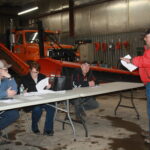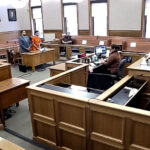My family always told me war stories — memories about how World War II made its mark on life in Aroostook County.
Maybe the most famous tale concerns my great-uncle, Gordy Beaulieu, a Navy man who served abroad. When his ship went down he was lost at sea for months, so long that the military listed him as missing in action. Somehow, at last, he was found and brought to safety. The story of his ordeal made it into the pages of Life magazine.
Most of the memories, though, reflected action here on the home front, where planes flew at all hours and the Presque Isle air base bustled with activity.
My maternal grandfather, Harold Larsen, served as an air raid warden in Presque Isle. My mother, a toddler when the war ended, and my aunt, six years older, told of how he’d often be called out in the night. Air raid drills called for all outside lights to be snuffed. Inside, they closed drapes and blinds, navigating in little to no light, until the safety siren blew the all-clear — so frightening for two little girls.
There were food rations. My grandmother Stella stretched flour and sugar until the next ration books were issued. Fresh yellow butter grew scarce. My aunt recalls how margarine came with a capsule of coloring; she and my grandmother took turns mixing the color into the dense white substance. And yes — they really did save bubble gum for days, even weeks, until they could obtain some again.
My dad still tells of how my paternal grandfather, Tom Brewer, hired German prisoners to work on the farm. There was a prisoner-of-war camp at the Presque Isle base, and the men, accompanied by guards, would help work the potato fields. My grandmother Laura would bring them some refreshment, sometimes including chocolate bars, a treat they received gratefully.
Dad remembers the planes — huge dark bombers — roaring to and from Presque Isle over the Crouseville fields, with vibrations that would shake the windows.
The family history feeds my interest in this time period, along with my own horrified fascination with Auschwitz, Bergen-Belsen, Sobibor — because we must be horrified to ensure we stand against such atrocity.
But a story recently came my way that was deeply affecting for its sheer triumph.
The tale tells of the Doolittle Tokyo Raiders, 80 men led by Lt. Col. James H. Doolittle, who carried out a bombing operation on April 18, 1942, designed to inflict damage on Japan in response to the Pearl Harbor attack. The men became the first to fly bombers from the deck of an aircraft carrier.
An account of the raid on the Naval History and Heritage Command website states, “Tests off the aircraft carrier Hornet (CV-8) off Norfolk, and ashore at Norfolk soon proved that while a B-25 could take off with comparative ease, ‘landing back on again would be extremely difficult.’” Thus, pilots were to land the planes at sites in China.
The 80 men underwent extensive training for the dangerous mission, facing the distinct possibility they would go down from enemy fire or lack of fuel. They flew anyway. Sixty-two of them survived.
Starting in 1946, the survivors reunited each year. An entire website, doolittleraider.com, preserves the stories and photographs of the men and their lives, including their reunions. That first year, the city of Tucson, Arizona, gave the group 80 silver goblets nestled in a wooden case, each bearing the name of one of the men. The case also held a bottle of Cognac, dated 1896 — the year James Doolittle was born.
The Raiders vowed when only two survived, those two would open the bottle and toast their comrades.
In November 2013, three of the four living Doolittle Raiders, in their 90s, decided not to wait until death claimed two more of them. They celebrated their final toast together at Wright-Patterson Air Force Base in Ohio, tipping the Cognac in a last salute amid much fanfare from military officials.
Hail to patriotism.
Reading this account stirred a thought: In a society that is so fraught with discontent, apathy and political hatred, the commitment and valor of this group of WWII soldiers reminded me — and should remind us all — that we are one country. No matter what we fight over or get ourselves into, the whole is greater than the sum of its parts. Democracy and freedom are privileges, bought with blood and sacrifice, worth fighting for, and those who fought are worthy of our gratitude and respect.
Paula Brewer is the assistant editor at Northeast Publishing. She can be reached at pbrewer@bangordailynews.com or (207)764-4471.








